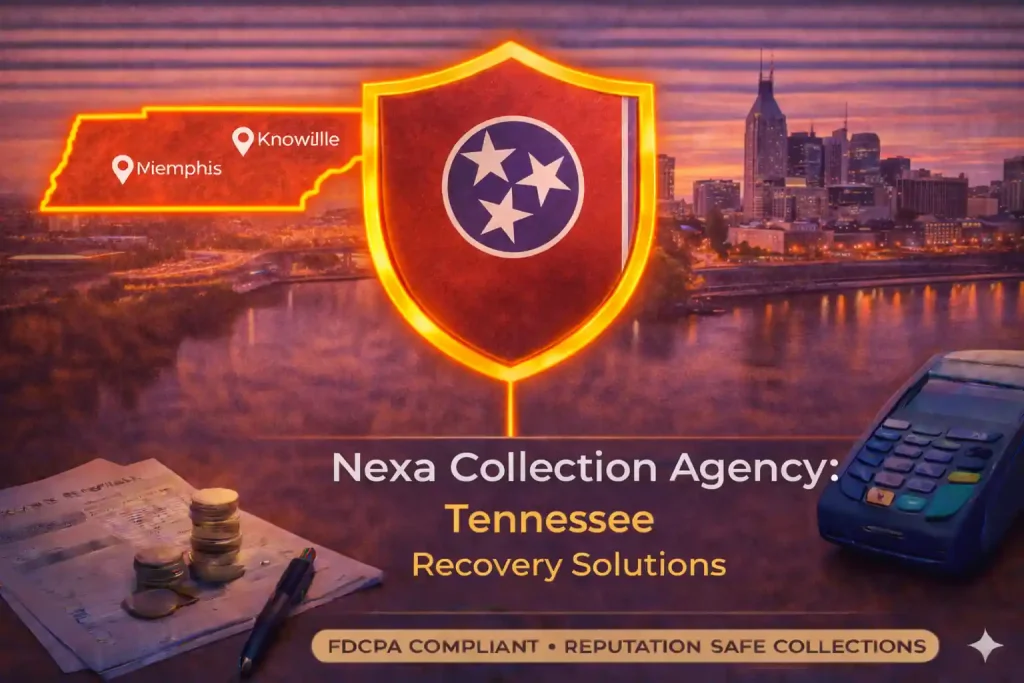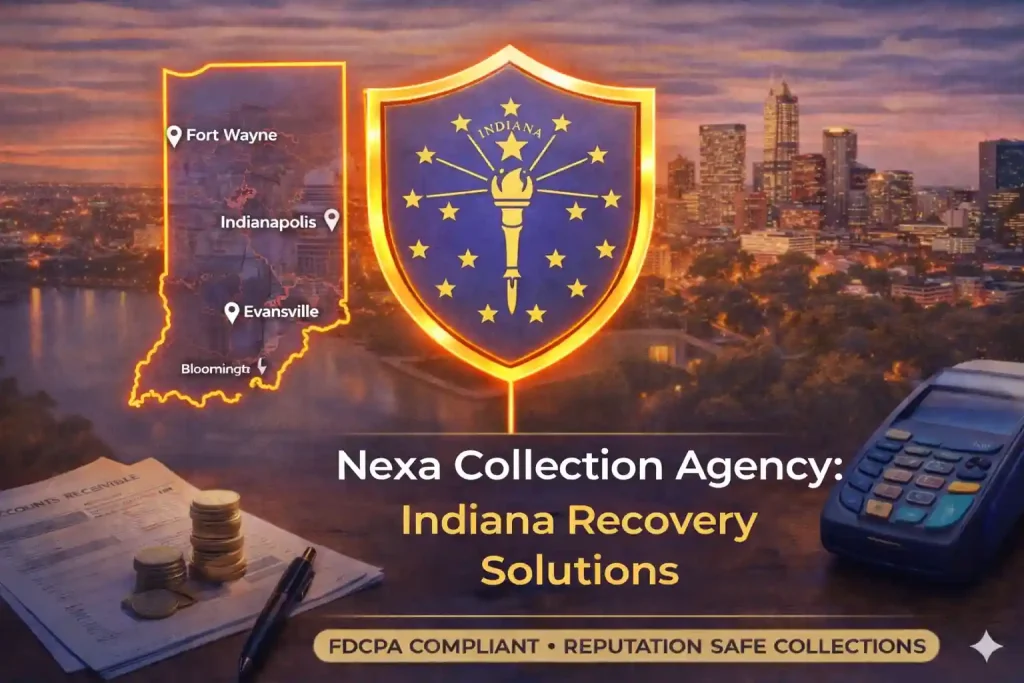Tennessee Medical Collections: The “Slow Pay” Motion Is Killing Your Cash Flow
Tennessee offers a fast track to judgment through its General Sessions Courts. But winning the lawsuit is only half the battle.
The real challenge begins after the judgment.
Tennessee allows any debtor to file a “Slow Pay” Motion (T.C.A. § 26-2-216). This single piece of paper can stop your wage garnishment cold and allow the patient to pay you as little as $25 a month—regardless of how much they actually earn.
If your current agency is celebrating “legal victories” but you aren’t seeing the cash, this is likely why. They are getting outmaneuvered by a simple procedural filing.
We don’t just file lawsuits and hope for the best. We use a “Pre-Legal” negotiation strategy designed specifically to prevent “Slow Pay” filings before they happen.
Nexa provides 100% reputation-safe, equipped with all 50-state collections license, offering free credit reporting, free litigation, free bankruptcy scrubs, and zero onboarding fees. Secure – SOC 2 Type II & HIPAA compliant. Over 2,000 online reviews rate us 4.85 out of 5.
Need a Collection Agency? Contact us
Deep Analysis: The 3 Revenue Traps in the Volunteer State
Collecting in Tennessee requires navigating specific statutes that protect debtors. Here is why the “standard” national approach fails here:
1. The “Slow Pay” Stalemate (T.C.A. § 26-2-216)
-
The Law: A judgment debtor can file a motion to pay the judgment in installments. If the judge approves it (which they often do based on a simple affidavit of expenses), all wage garnishment is stayed as long as they make those payments.
-
The Risk: You might spend $300 on court costs to get a judgment, only for the judge to order a $20/month payment plan. At that rate, a $2,000 bill takes 8 years to pay off.
-
Our Solution: We anticipate the “Slow Pay” tactic. We negotiate voluntary payment plans before going to court. We explain to the patient: “If we go to court, the judge controls the plan, and it goes on your public record. Let’s agree to $100/month privately right now.” This often secures higher payments than a judge would grant.
2. The Hospital Lien “120-Day” Deadline
-
The Law: To secure a lien on a patient’s personal injury settlement, you must file a verified statement with the court clerk within 120 days of the patient’s discharge.
-
The Risk: Many agencies wait until an account is 120 days past due to even start working it. By then, your lien rights are dead. You lose your priority claim on the auto accident settlement.
-
Our Solution: We flag “Trauma/MVA” accounts immediately upon intake. We file the lien well within the 120-day window and serve the required notice to the patient and attorney within 10 days, locking in your payout.
3. The “Dependent Child” Exemption
-
The Law: While Tennessee follows the federal 25% garnishment rule, it adds a specific state exemption: debtors can deduct an additional $2.50 per week for each dependent child under 16 living in the state.
-
The Risk: It sounds small, but for low-income patients with large families, these exemptions stack up, reducing your garnishment to nearly zero.
-
Our Solution: We verify family size early in the process. If a patient is “garnishment proof” due to low income and many dependents, we don’t waste money suing them. We pivot to tax refund interception (if applicable) or long-term monitoring.
Our 4-Step “Volunteer” Recovery System
We have calibrated our model to leverage Tennessee’s 6-year statute of limitations while avoiding the “Slow Pay” trap.
Phase 1: The “Slow Pay” Screen (Pre-Collection)
-
The Strategy: We analyze the patient’s credit profile. If they have a history of filing “Slow Pay” motions or have multiple judgments, we know legal action is a trap. We route these accounts to our intensive phone negotiation team instead.
-
Cost: Included in service.
Phase 2: The Statutory Interest Demand (Steps 1 & 2)
-
The Strategy: Tennessee judgments accrue interest at a formula rate (currently approx. 9-10%). We include this calculation in our demand letters. Showing a patient that their $1,000 bill will grow by $100 a year is a powerful motivator to settle now.
-
The Cost: Flat fee (approx. $15/account). You keep 100% of recoveries.
Phase 3: The “Better Than Court” Offer (Step 3)
-
The Strategy: We use the threat of court costs (which are added to the debt) to negotiate. “Mr. Smith, if we sue, you’ll owe the debt plus $250 in court fees. Let’s set up a plan for the original balance today.” This keeps you out of the “Slow Pay” system.
-
The Cost: 40% contingency.
Phase 4: General Sessions Execution (Step 4)
-
The Strategy: For refusals who can pay, we file in General Sessions Court. It’s fast and cost-effective. If they try to file a “Slow Pay” motion with a fake budget, we challenge it. We demand proof of their expenses to ensure the judge sets a fair payment amount, not just a token $20.
-
The Cost: 50% contingency.
Regional Strategy: Memphis to Bristol
Tennessee is economically diverse. We adjust our tactics based on the patient’s location.
| Region | Economic Profile | Collection Strategy |
| Nashville (Davidson Co.) | Boomtown / Healthcare | High volume of renters. We focus on bank levies rather than wage garnishment, as job hopping is common but bank accounts tend to stay stable. |
| Memphis (Shelby Co.) | Logistics / Urban | Courts are very busy. We use “Consent Judgments”—agreements signed before court—to speed up the process and skip the waiting line. |
| Chattanooga / Knoxville | Manufacturing / Service | We track large employers (VW, Amazon, Eastman) for garnishment cycles. We know their payroll schedules and time our orders to hit effectively. |
FAQ: The Executive Summary
Q: What is the Statute of Limitations in Tennessee?
A: You have 6 years to sue for medical debt (T.C.A. § 28-3-109). This applies to both written contracts and “open accounts,” giving you a decent window to recover revenue.
Q: Can I charge collection fees to the patient?
A: Only if your admission paperwork explicitly states it. Tennessee courts generally uphold “reasonable” attorney fees (often 1/3 of the debt) if the patient signed a contract agreeing to pay them. We audit your forms to ensure this clause is valid.
Q: What happens if a patient files a “Slow Pay” motion?
A: The garnishment stops. However, if they miss a single payment, the stay is lifted, and we can resume garnishing their full wages immediately. We monitor these payments like a hawk.
Don’t let a $25 filing fee freeze your revenue.



